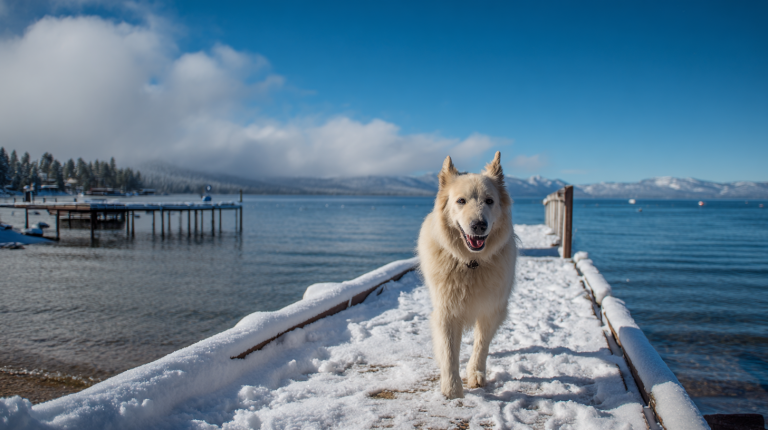Let’s talk about dogs and wildfires. California’s wildfire season brings numerous challenges, not just for people but for their four-legged friends as well. As a dog owner or traveler in California, it’s crucial to understand how to protect your pets during these times. A recent study from the University of Arizona discussing California wildfires says “Comprehensive emergency plans that consider the needs of pets are crucial.”
Here are five critical things you should know about dogs and wildfire safety.
Dogs and wildfires: Limit outdoor activities
Wildfires significantly deteriorate air quality, posing serious health risks to dogs. Thick smoke and particulate matter can lead to respiratory issues, allergies, and exacerbate existing conditions such as asthma. Dr. Gabrielle Fadl of the Bond Vet Clinic in New York City notes that exposure to polluted air can profoundly impact pets’ health, causing symptoms like coughing, sneezing, and wheezing.
Actionable tip: Minimize the time your dog spends outdoors during wildfire season. Avoid strenuous activities such as running. Instead, opt for slow, short walks during periods when air quality is relatively better, typically early in the morning before air quality worsens with the day’s heat and wind.
Dogs and wildfires: Create a safe indoor environment
Even if your dog is indoors, they can still be affected by poor air quality. Ensure that your home is a safe haven from outdoor pollutants. Keep windows and doors closed and use air purifiers with HEPA filters to improve indoor air quality. According to Dr. Bruce Kornreich from the Cornell Feline Health Center, wildfires can produce harmful compounds like hydrogen cyanide and carbon monoxide, which can enter the bloodstream and interfere with oxygen delivery to organs.
Actionable tip: Regularly clean your home to reduce the amount of ash and dust. Wipe your dog’s muzzle, paws, and coat with a damp cloth after they’ve been outside to remove any lingering smoke particles.
Dogs and wildfires: Hydration and comfort
During wildfire season, ensuring your dog stays hydrated is more important than ever. Smoke and heat can quickly dehydrate pets. Provide plenty of fresh water both indoors and outdoors. Keeping your dog engaged with indoor activities can also help reduce their stress levels.
Actionable tip: Use puzzle toys filled with treats or kibble to keep your dog mentally stimulated and distracted from the stress of staying indoors. Maintain a consistent routine to provide a sense of normalcy for your pet.
Dogs and wildfires: Monitor for symptoms
Dogs, like humans, can suffer from the effects of smoke inhalation. Be vigilant for any signs of respiratory distress or discomfort in your pets. Common symptoms include coughing, sneezing, difficulty breathing, and lethargy. Changes in behavior, such as decreased activity levels, can also indicate that your dog is struggling with the air quality.
Actionable tip: If you notice any concerning symptoms, seek veterinary care immediately. Dr. Jessica Bell of Washington State University advises that even indoor pets should be monitored closely for signs of respiratory distress. Keeping an eye on your pet’s health can prevent minor issues from becoming major problems.
Dogs and wildfires: Emergency preparedness
Having a well-prepared emergency “go bag” for your dog can make a significant difference in a crisis. This should include a supply of food and water for at least five days, medications, medical records, a pet first aid kit, and comfort items like a favorite toy or blanket. Ensure your dog has a collar with updated identification tags and a sturdy leash.
Actionable tip: Plan your evacuation routes in advance and identify pet-friendly accommodations. Practice crate training and familiarize your dog with wearing a muzzle, as they may be required in certain emergency shelters.
Wildfire season in California poses unique challenges for dog owners and travelers. By limiting outdoor activities, creating a safe indoor environment, ensuring hydration and comfort, monitoring for symptoms, and being prepared for emergencies, you can protect your furry friends from the harmful effects of wildfire smoke. Staying informed and proactive can make all the difference in keeping your dog safe and healthy during wildfire season.
Here are the links to the source material used in the article:










